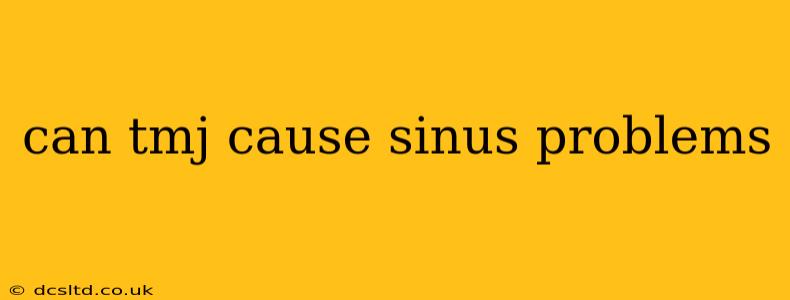Can TMJ Cause Sinus Problems? Understanding the Connection
Temporomandibular joint (TMJ) disorders and sinus problems might seem unrelated, but surprisingly, there's a potential connection. While TMJ doesn't directly cause sinus infections, the anatomical proximity of the TMJ to the sinuses and the intricate network of nerves and muscles in the facial region mean that problems in one area can significantly impact the other. This article explores this complex relationship and answers frequently asked questions about TMJ and sinus issues.
What is TMJ?
The temporomandibular joint (TMJ) connects your jaw to your skull. It's a complex joint responsible for chewing, speaking, and yawning. TMJ disorders (TMD) encompass a range of conditions affecting this joint, causing pain, clicking, popping, locking, headaches, and even earaches. These disorders can stem from various factors, including injury, arthritis, bruxism (teeth grinding), stress, and even genetic predisposition.
What are Sinus Problems?
Sinus problems, or sinusitis, involve inflammation or infection of the sinuses—air-filled cavities located around your nose and eyes. Common symptoms include facial pain or pressure, congestion, headache, and post-nasal drip. Sinusitis can be acute (short-term) or chronic (long-term) and is often triggered by viral or bacterial infections, allergies, or nasal polyps.
How Can TMJ Affect My Sinuses?
The close proximity of the TMJ to the sinuses is key. Muscle tension and inflammation associated with TMJ disorders can put pressure on the sinuses, potentially leading to sinus pain or congestion. This is because the muscles involved in jaw movement (like the masseter and temporalis muscles) are closely connected to the structures surrounding the sinuses. Furthermore, TMD can affect the drainage of the sinuses. Malocclusion (improper bite alignment), a frequent contributor to TMD, can also contribute to sinus problems.
Can Sinus Infections Cause TMJ Pain?
While less common, the reverse can also occur. Severe sinus infections, particularly those causing significant inflammation and pressure, can sometimes radiate pain to the jaw and temporomandibular joint, mimicking symptoms of TMD. The intense inflammation and pressure within the sinus cavity can affect the surrounding tissues, leading to referred pain in the TMJ region.
What are the Symptoms of TMJ and Sinus Problems Together?
Experiencing both TMJ and sinus symptoms simultaneously can be challenging to diagnose. Overlapping symptoms make it difficult to pinpoint the primary cause. Common symptoms that may indicate a connection include:
- Facial pain: Pain in the cheeks, jaw, and around the eyes.
- Headaches: Particularly those affecting the temples or forehead.
- Earaches: Referred pain from either TMJ or sinus inflammation.
- Jaw pain or clicking: Characteristic of TMD.
- Congestion and post-nasal drip: Typical of sinus issues.
- Difficulty opening the mouth: A hallmark symptom of TMD.
How are TMJ and Sinus Problems Diagnosed?
Diagnosing these conditions often requires a thorough examination by healthcare professionals. A dentist or oral surgeon can assess the TMJ for signs of dysfunction, while an ENT (ear, nose, and throat) specialist can evaluate the sinuses for infection or inflammation. Imaging techniques like X-rays or CT scans may be used to rule out other conditions and confirm the diagnosis.
What Treatments are Available?
Treatment options for TMJ and sinus problems often depend on the severity and underlying cause. For TMJ, treatment might involve medication for pain and inflammation, physical therapy, splints or mouthguards to reduce teeth grinding, and in some cases, surgery. Sinus problems may be treated with antibiotics for bacterial infections, nasal corticosteroids for inflammation, or surgery to correct structural issues. In cases where there's a clear connection between TMJ and sinus problems, a multidisciplinary approach involving both a dentist/oral surgeon and an ENT specialist may be beneficial to effectively manage both conditions.
Disclaimer: This information is for educational purposes only and is not a substitute for professional medical advice. If you suspect you have TMJ or sinus problems, consult a healthcare professional for diagnosis and treatment.
